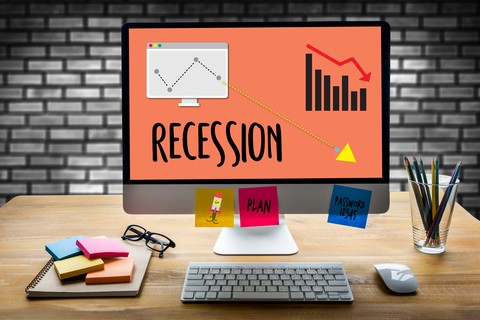How to Prepare for the Next Recession

For those of us who experienced the Great Recession, even hearing whispers that a recession is likely to occur in the next few years is enough to make us cringe. For those of you who had the luxury of not experiencing the Great Recession of the late 2000s, you missed out on a high unemployment rate, difficulty finding jobs, layoffs, foreclosures, and businesses closing. As someone who was graduating from college amidst all of that economic turmoil, I can say first hand that the recession greatly impacted my ability to find employment. In fact, at the end of the Great Recession, the national unemployment rate was at 10% and the amount of time that it took job seekers to become employed spanned months. Even seemingly qualified candidates struggled to find employment.
Feeling concerned yet? We all should be. While we cannot predict when another recession will hit (or if it will reach the magnitude of the Great Recession), we should be preparing ourselves and setting ourselves up for success in the event of an economic downturn.
The following are a few ways that you can actively prepare for a change in the economy now rather than reacting when it’s too late.
Make yourself indispensable at your current job. By finding ways to become indispensable in the workplace, you can improve your job security should a recession occur. Make sure that your work reflects both high productivity and high standards for yourself. Don’t wait for opportunities to present themselves, actively seek additional responsibilities to add to your role, and find ways to become an integral part of the team. Don’t forget to involve management so that they are aware of your contributions. In other words, accept credit when credit is due.
Widen your skillset to improve your marketability. It is difficult to pinpoint and predict exactly which industries will take the biggest hit during a recession, making it necessary to have a wide variety of transferable skills and training. Should you find yourself unemployed during a recession, you may need to call upon those skills to make a career move into another industry—possibly an industry that you have little to no experience in. One way to hone different skillsets is to seek opportunities within your current job by taking on new responsibilities or asking a coworker in a different department to mentor you. Those skills that you develop now may prove to be invaluable in a declining market.
Start practicing smart financial habits now. Knowing that it is simply a matter of time until the market shifts, take stock of your financial situation. The last thing that you want is to wait until you are unemployed during a recession to pay attention to the amount in your savings account. A good rule of thumb is to have enough money saved that should you lose your source of income, you can still pay your bills for a few months (at least). In addition to saving, pay off those debts and do your best to not accrue any more.
Get creative to earn additional income. As you become more financially savvy, consider seeking opportunities to earn additional income. Part time positions that do not negatively impact your current job, can add to your savings account and expand your skillset are a good idea regardless of the impending economic recession.
Do not become complacent: Lastly, resist the urge to become complacent in your job. Complacency often leads to decreased productivity, which could end in unemployment during a recession. In addition to maintaining a high level of productivity and becoming an indispensable member of your team, make sure that you keep your eye open for new employment opportunities. Dust off that resume from time to time and put yourself out there to see how you measure up to other job seekers.

